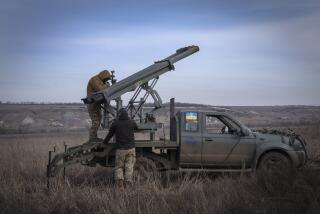Soviet Chemical Arms Cut: Little Impact but Problems for Bush
- Share via
WASHINGTON — The Soviet Union’s announcement that it will begin this year to destroy some of its chemical weapons--much like its earlier pledge to reduce military troop strength--appears to be an attempt by Moscow to turn economic necessity into a propaganda victory and in the process to pose new troubles for the incoming Bush Administration.
U.S. officials maintain that, so far at least, the Soviet steps, including the promised reduction of about 10% in total troop strength, have little military impact. But they grudgingly admit that Soviet President Mikhail S. Gorbachev appears to be seizing the high ground in the battle for world public opinion, especially in Western Europe.
Soviet Foreign Minister Eduard A. Shevardnadze outlined plans to begin reducing Moscow’s arsenal of poison gas weapons Sunday in his speech to a 145-nation conference on chemical warfare in Paris. Although much of the program had been made known earlier, Shevardnadze’s announcement cast it in dramatic terms and captured headlines around the world.
In dealing with chemical weapons, American analysts believe that Moscow faces a problem similar to that which led the Pentagon to begin destroying its chemical weapons a few years ago: The aging stocks of poison gas had become militarily obsolescent and dangerous to keep around.
“The Soviets have a lot of obsolete weapons and it would only make sense for them to begin destroying them,” a senior U.S. official said.
The United States stopped producing chemical weapons in 1969 and has been slowly destroying its old chemical stocks. In October, 1987, Congress approved plans to begin producing a new generation of weapons consisting of two chemicals, each harmless in itself, that form lethal gas when mixed. The Reagan Administration maintains that such weapons are safer to store and are less subject to accidental release of toxic fumes than the older gas munitions.
In 1987, Gorbachev admitted for the first time that the Soviet Union had a chemical arsenal and at the same time announced an end to Soviet production of the weapons.
Lynn Hansen, a senior official of the U.S. Arms Control and Disarmament Agency, said the Soviet plan does no more than match an earlier U.S. program of voluntary destruction of some chemical weapons. But he said that Moscow’s move seems to be getting more attention.
The superpower propaganda contest has serious military and diplomatic implications. If the Soviets can persuade public opinion in the United States and Western Europe that they are less menacing than they once appeared, it will become difficult for the democratic governments in the North Atlantic Treaty Organization to maintain their own military programs--including an already controversial plan to modernize battlefield nuclear weapons.
President-elect Bush, who has said that he hopes to put NATO at the top of his foreign policy priority list, may find it hard to keep the alliance together in the face of a Soviet peace offensive.
As with Gorbachev’s announcement last month of the 10% troop reduction over two years, Shevardnadze said the Soviet Union will act on its own, without waiting for the outcome of negotiations over a global ban on chemical weapons.
More to Read
Sign up for Essential California
The most important California stories and recommendations in your inbox every morning.
You may occasionally receive promotional content from the Los Angeles Times.













